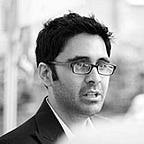What We Talk About When We Talk About America
The Flaw and the Myth
In this last essay about American collapse — quite frankly the last one I ever hope to write, but we’ll get to that — I want to discuss what I’ve learned from writing them. Let’s recap the story I’ve told.
My story of American collapse in these essays is starkly at odds with the prevailing narrative — that it’s a model of prosperity. I think that if we look dispassionately at reality, America never worked. It went straight from segregation to stagnation in precisely the same year, 1971, and that tells us in no uncertain that it never built a social contract that functioned in genuine terms, only always relied on a pool of cheap, pliable labour, from which to extract human potential. Hence, the rise of Trumpism was just a matter of time. There just isn’t enough genuine prosperity to go around — mostly paper gains for the .01%, which belie a lack of working healthcare, education, transport, media, and so on.
So Trumpism is an effect, not a cause. It is the ultimate result of America’s original sins: slavery, hate, greed, which prevented it from building what the rest of the rich world enjoys — strong, fundamental rights, embedded in advanced constitutions that guarantee sophisticated and robust democracies that utilize innovations like compulsory voting. Maybe in the Wild West, the right to pack a revolver was enough — but not in the 21st century. Instead, America chose to continue a long standing tradition of exploitation of the many for the benefit of the few — only this time, it wasn’t just blacks, but poor whites, and now even middle class whites. Hence, a revolt by them, against an establishment that’s turned a blind eye to every flavour of suffering unimaginable in a rich society, from a lack of healthcare, to mass shootings at schools.
And yet. The prevailing belief in America is still that this mess will fix itself — given another election, things will return to normal, a nice normal President will be elected by nice normal people and choose nice normal policies that guarantee nice normal times. If you really understand all the above, then that belief is exactly wrong. America can’t fix itself until and unless it understands that it never really worked in the first place. Can it do that?
Now we come to what I’ve learned from talking about America. You can’t, really.
I began writing this series of essays knowing it would be painful and costly, both reputationally and relationally. I knew I’d make more enemies than friends and that there was less than nothing to gain. Contrary to popular belief, I don’t make any money, win any fans, or earn any plaudits for writing this stuff. So why did I do it? I didn’t harbour any illusion that I could change things. But I did want to test for myself the hypothesis of just how broken America really is. Could it really grasp the narrative I’ve put forward? After all, the logic is airtight. You can go ahead and deny it until kingdom come, but the facts are crystal clear. It is either one of history’s greatest coincidences, a kind of cosmic magic trick, that stagnation began at the exact moment that segregation ended, or there is a clear and causal relationship there, from which we can infer the truth of the American social contract.
What I’ve learned is the very opposite. America needs to constantly be reassured of its myths of perfection and purity, and by doing so, it is kept comfortably insulated from the inconvenient reality of its very own flawed history. Let me put that another way. If America were a person, we’d say that person believes in a grandiose self, denies the value of human relationships, and needs constant reaffirmation and validation of their superiority, or else they suffer a kind of breakdown between the ideal self and lived self, that causes deep rage. In other words, narcissism. We can call the narcissism of nations by another set of words. Arrogance, hubris, pride. It is one thing to be patriotic, whatever that even means anymore. It is another entirely to cling to unreality at the expense of one’s possibility. That is pathology, not patria.
All of that brings me to my “take” on the American future. Maybe towards the end of our lifetimes, you’ll hear my story of American collapse discussed in the media, textbooks, and so on. Surely sooner or later historians will tell it, because it is uncompromisingly factual, not blindly mythological. But that is precisely the problem. We don’t have a lifetime to waste on the foolish aggrandizing fictions of pundits and talking heads and cable news “analysts”. Or at least I don’t.
What does the future hold for America? This. Just more, harder. Remember my trifecta of indicators for a society collapsing? Falling life expectancy, stagnant income, and a shrinking middle class. More of that is the American anti-future. A long, slow senescence into sweet oblivion, punctuated by daily horrors like more mass killings, medical bankruptcies, impossible levels of debt, dwindling human potential, lives of quieter desperation. Why? What else could the future hold? Like any wounded soul, until and unless and America can come to grips with its flaws, it cannot heal, grow, prosper. Yet so far as I can see, America’s fatal flaw is this: it simply refuses to see itself as flawed at all.
Umair
August 2017
